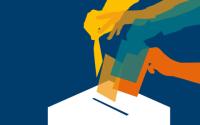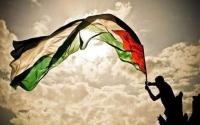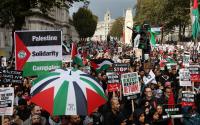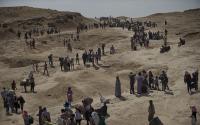Day of disaster that shattered a nation's faith in itself - and the illusions of its people
Guardian, Wednesday September 12, 2001
Terrorism happened in faraway places. Until yesterday
Only history will relate, and even then haphazardly, what really happened at the heart of the US government yesterday as it faced its greatest crisis of all time. We may never know how President Bush actually responded away from the TV cameras to a day of disaster that will rank in American infamy close to Dallas and Pearl Harbour, a day that may for a long time render the Hollywood catastrophe movie redundant.
Sustained by bewilderment and ignorance of the scale of the devastation the people of Washington, and apparently New York, reacted with impressive calm. But between the top and bottom of society there was evidence of panic-stricken decision making from officials who have simply no experience not merely of terrorism on this scale but of anything remotely like it.
It is hard for outsiders to grasp just how calm and structured day-to-day life is for most Americans. Our images come from TV and films, which by their make-up emphasise lawlessness. Our perceptions come from newspaper stories of occasional horrific and wacky murders. Our own memories come from visiting tourist areas, which by their nature attract criminals. This tells us nothing about the work/family/car/TV/shopping mall existence of people, a way of life that has seemed wholly invincible.
In many respects this is a strikingly more relaxed society than Britain. At home, people are more likely to know their neighbours, leave their doors unlocked, tell the delivery men to dump the stuff on the porch. Obviously, that old-fashioned confidence primarily belongs to the white middle class. But even on the streets, closed circuit TV - far from being the ubiquitous supposed boon of British cities - is barely even a rumour.
Visitors who do nothing stupid are less likely to feel threatened on the streets of Washington than in the centre of London. It is this background that has enabled the people - and their politicians - to shrug off scares of global warming and environmental meltdown. This is America. What can harm us?
Above all, there is no experience of terrorism. Except for the two major operations on the original World Trade Centre attack in 1993 and the Oklahoma City bomb of 1995, this kind of attack has been confined mainly to "abroad", that strange and mystical place little experienced by most Americans, including their president.
Even when Americans have been targeted, it has usually happened in faraway places with strange-sounding names such as Beirut or Dar-es-Salaam, reinforcing the popular instinct that this is the only safe and sensible country in the world, a place where the greatest terror is poison ivy at summer camp. It is an instinct that traditionally leads on to political isolationism.
In America you can still - or you could until yesterday - put a bag in a locker at a bus or railway station without anyone presuming that there might be a bomb inside and demanding the right to check. This right disappeared from Britain and Europe in the early 1970s, when bombings and hijacking became a commonplace of our lives. Airport inspections, though theoreti cally efficient, have become perfunctory and routine in a country where thousands and thousands of planes land uneventfully every day.
Countless opponents of the president's missile defence programme have pointed out the futility of spending billions of dollars trying to anticipate the direction of a nuclear attack when a carbomb, a suitcase, or a lone maniac can cause any amount of havoc.
No one can have anticipated the real potential of a few hijacked planes; even so there will be widespread grim satisfaction of a kind among George Bush's opponents today. But it is necessary to understand the illusion of security that Americans had enjoyed which has made the fantasy of total safety so politically potent.
In his second televised address after the disasters, the president intoned: "We have taken all appropriate security precautions to protect the American people." Never has a politician's bromide sounded so ludicrously hollow. This is a huge country; it cannot secure its one sensitive land frontier to keep out illegal immigrants; it cannot secure its coasts to keep out shiploads of illegal drugs. In the modern world, against ruthless, determined and invisible opposition, protection is an impossible ideal. And until now, it has never seemed remotely necessary.
A spokesman travelling with the president may have given the game away when he listed the two priorities of the day: 1 The president's safety; 2 Getting him back to Washington to reassure the American people.
This information was vouchsafed via CNN from an undisclosed military base, seemingly a long way from Washington. There were also reports that congressional leaders had been taken away to a secret location. As displays of courageous leadership go, none of this ranks with standing on a tank in the streets of Moscow or even remaining in Buckingham Palace throughout the blitz.
It was the junior officials who control so much of America who most needed reassurance. By mid morning it was not only the White House and the state department that had been evacuated. All the office buildings close to either the geographic or actual heart of the federal government had been evacuated.
This included obvious secondary targets such as the FBI building - though one trusts that the anti-terrorism section had not been sent home - as well as such improbably sites as Borders bookshop and Quizno's sandwich shop. Only the Bombay Club restaurant, with Asian fatalism, deemed to be ignoring official pressure and carrying on as normal. As people rushed to the car parks to try to get out of town, every street close to the White House became hopelessly gridlocked: half a block in half an hour became the norm. It would have taken a huge effort for the president to reach home even if he had decided to come.
The response was too confused to be called phlegmatic. With the Washington metro shut down, crocodiles of office workers set out on a hot day to start out what might be a long walk home.
Anyone with a mobile phone tried frantically, and nearly always unsuccessfully, to dial someone, anyone. The shrewd ones sat in the sunshine and waited for the facts and the streets to become clearer. Knots of people formed on street corners close to anyone who had a portable TV or a radio set. "Oh my God," said one young woman as she watched the World Trade Centre fall. "Oh my God."
For the most part no one knew what was happening, never mind why. The media fed in misinformation and absurd irrelevancies. There was a bomb at the Capitol, we were told, yet it still stood, glinting under glorious skies. One Washington all-news radio station had a long discussion about the likely consequences for the stock markets.
That is for another day. The most awful consequences face those who have lost loved ones. For America at large the most awful consequence is nothing to do with the Dow, nothing to do with President George Bush, nothing to do with his facile promises "to hunt down and punish those responsible", nothing to do with missile defence.
To an extent unknown for at least one generation and maybe two, the United States' faith in itself has been shattered. That will end a certain amount of smug self-satisfaction. But it also endangers the wonderfully secure routine of the lives of the people.






